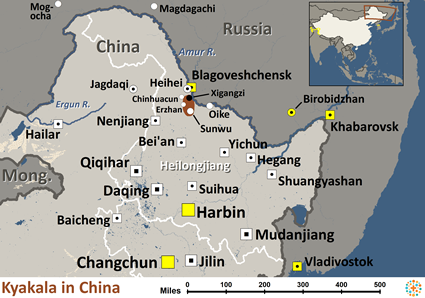The Kyakala are the remnant of a people whose assimilation into surrounding nationalities was hastened by the large populations of their neighbors. The Kyakala were initially consumed into the Manchu nationality, which in turn has largely been swallowed up by the Han Chinese. Assimilation occurs when "members of minority groups have absorbed the characteristics of the dominant group to the exclusion of their own and become indistinguishable from members of the majority."
The Kyakala area was controlled by the Japanese between 1932 and 1945. Horrific cruelty was inflicted on the inhabitants of Manchuria. "Over 4,000 were exterminated in bestial fashion; some were frozen or infected with bubonic plague, others were injected with syphilis, and many were roasted alive in furnaces." Fu Yuguang of the Jilin Institute of Ethnic Studies in Changchun is presently the most competent scholar on the Kyakala.
Many Kyakala people today earn their living from their involvement in cross-border trade with the Russians. The main items traded are food, clothing, and household goods.
Once a people dominated by shamanism, the Kyakala show few traces of their former religion today. Most of these people are nonreligious, although many elderly Kyakala retain ancestor worship practices in their homes.
A revival in the 1990s swept through many parts of Heilongjiang Province but did not encompass the Kyakala area in the northwest of the province. The Kyakala would now best be reached by using the Chinese Scriptures.
Without the guidance of Christ, these people are like sheep without a shepherd. They need the good shepherd in their families and communities.
Pray for the Lord to intervene in their families, calling people to his side.
Pray for the Lord to send workers.
Pray for their hearts to be drawn to the Lord of lords.
Pray for a church planting movement to thrive in their communities.
Scripture Prayers for the Kyakala in China.
Operation China, Asia Harvest, Copyrighted © Used with permission
| Profile Source: Joshua Project |

























